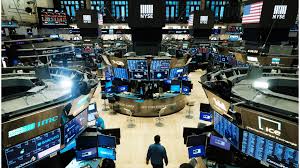This week, Asian markets closed lower, following the trend of European exchanges and US futures indices. Investors are cautious, assessing the global monetary policy landscape and new fears regarding the Chinese real estate market.
China Evergrande Group, one of the country’s leading real estate companies in terms of sales, filed for Chapter 15 protection in New York on Thursday. This move aims to safeguard its US assets from creditors.
This news raises additional concerns about the possibility of problems in the Chinese real estate market spreading to other areas of the economy.

On Thursday, yields on 10-year US Treasury bonds reached their highest level since October 2022. This increase came in response to the release of minutes from the July meeting of the Federal Reserve (Fed), which suggested the possibility of further interest rate hikes, given policymakers’ ongoing concerns about inflation.
In Europe, investors are reacting to UK retail sales data and eurozone inflation figures released this morning.
In light of these events, indications suggest another session characterized by risk aversion. This trend follows the performance of the Ibovespa, which recorded a record 13 consecutive days of decline yesterday, with no signs of positive reversal in August.
World Stock Markets:
United States: US futures indices are declining, heading towards ending the week in the red. Investors are still processing the Fed’s minutes released on Wednesday, indicating the continued concern of the monetary authority about inflation and the possibility of further interest rate hikes.
The Dow Jones is heading towards its worst week since March, with a 2.29% decline as of Thursday. Meanwhile, the S&P 500 is on track for its third consecutive week of losses, a sequence not seen since February. The Nasdaq is also heading for its third consecutive week of losses, something not seen since December.
Regarding corporate earnings, Palo Alto Networks will report after the markets close.
Here is the performance of futures markets:
- Dow Jones Future (US): -0.09%
- S&P 500 Future (US): -0.11%
- Nasdaq Future (US): -0.21%
Asia: Asian markets closed lower, with investors digesting Japan’s inflation data for July and facing new concerns in the Chinese real estate sector.
Japan: Core inflation in Japan in July decreased to 3.1%, compared to June’s 3.3%, aligning with economists’ expectations surveyed by Reuters.
Global Inflation: In July, the global inflation rate remained steady at 3.3% compared to the previous month.
China: Chinese giant Evergrande filed for bankruptcy protection in a US bankruptcy court. The company sought protection under Chapter 15 of the US bankruptcy code, which aims to protect non-US companies undergoing restructuring from their creditors.
India: Adani Enterprises shares rose 7.21% on Friday, leading gains in India’s Nifty 50 index. This came after a report from the Economic Times suggested that the Abu Dhabi National Energy Company, also known as Taqa, is considering a major exposure to Adani’s Indian energy sector.
Performance of Asian Markets:
- Shanghai SE (China): -1.00%
- Nikkei (Japan): -0.55%
- Hang Seng Index (Hong Kong): -2.05%
- Kospi (South Korea): -0.61%
- ASX 200 (Australia): +0.03%
European Markets:
European markets are trading in negative territory, reflecting global investor caution regarding the future of monetary policy, new concerns about the Chinese real estate sector, and economic data from the region.
In the UK, retail sales fell by 1.2% compared to the previous month and by 3.2% year-on-year in July. These numbers were significantly below economists’ forecasts surveyed by Reuters, who expected a decline of only 0.5%, and below the monthly expansion of 0.6% observed in June.
In the Eurozone, the consumer price index in July increased by 5.50% year-on-year, but had a slight decrease of 0.10% month-on-month, in line with market consensus.
Here is the performance of the main European indices:
- FTSE 100 (UK): -0.85%
- DAX (Germany): -0.75%
- CAC 40 (France): -0.91%
- FTSE MIB (Italy): -0.80%
- STOXX 600: -0.86%
Commodities:
Commodities are basic products traded in financial markets. They are often divided into two main categories: soft commodities and hard commodities.
Soft Commodities include agricultural or cultivated products, such as wheat, corn, coffee, cocoa, sugar, and cotton. The production of these commodities is highly influenced by climatic factors such as rainfall, droughts, and temperatures. Additionally, issues related to global supply and demand, government policies, and even geopolitical issues can affect soft commodity prices. For example, a bumper crop can lead to oversupply and consequently a price decline, while extreme weather events can reduce production and elevate prices.
Hard Commodities are natural resources extracted or produced, such as crude oil, natural gas, precious metals (gold, silver, platinum), and industrial metals (such as copper, aluminum, nickel). Hard commodity prices are often influenced by global supply and demand, technological developments, geopolitical and political issues, as well as economic conditions. For example, a globally expanding economy generally drives demand for industrial metals, while political instabilities in oil-producing regions can lead to supply disruptions and increase oil prices.
Commodity prices are widely traded on exchanges, where traders speculate on future price movements, and producers and consumers use futures contracts to hedge against price fluctuations. Commodities play a crucial role in the global economy as they are essential components in various industries and sectors, including agriculture, energy, manufacturing, and construction.
Oil prices are recording slight losses, poised to interrupt a seven-week winning streak, due to concerns about slowing demand in China as its economy slows and the possibility of higher interest rates in the US.
On the other hand, iron ore prices closed sharply higher, reaching the seventh consecutive high. This movement still reflects expectations of further government support measures for the sector.
- WTI Crude Oil: -0.01%, at $80.38 per barrel
- Brent Crude Oil: -0.14%, at $84.00 per barrel
- Iron ore traded on the Dalian exchange rose by 2.94%, reaching 771.50 yuan, equivalent to $105.81.

